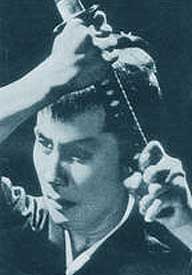 The individual scenes in Trail of Traps (Kyoshiro Nemurai: Burai-hikae masho no hada, 1967) are clever, a series of "traps" which end in teh death of members of the Black Finger group, an evil underground christian organization which wants possession of the Dutch gold religious relic worth 30,000 ryo. The individual scenes in Trail of Traps (Kyoshiro Nemurai: Burai-hikae masho no hada, 1967) are clever, a series of "traps" which end in teh death of members of the Black Finger group, an evil underground christian organization which wants possession of the Dutch gold religious relic worth 30,000 ryo.
Director Kazuo Ikehiro is not strong with plots, but he's great with capturing character images & violent action. As a whole the film is weak & silly. Those individual clever scenes have only the thinnest of connections to each other. The plot amounts to "try to kill Nemuri even though he doesn't have the relic."
Typical of the traps is when he happens on a hot springs where a beautiful naked woman is drying her hair, as though she had just come out of the water.
She says, "Don't mind me! The hot springs is nice!" As Nemuri removes his swords & prepares to undress, the woman leaps at him, but fails to push him in the water, which turns out to be an arsenic spring.
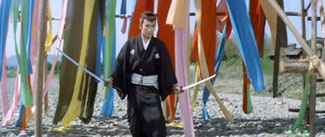 Several Black Finger members leap out of nowhere & Nemuri can't reach his swords. However, he has a flat paper fan, because that would've been handy if the hot springs had worked out, & he uses the edge of the open fan to paper-cut the eyes of his attackers, blinding them. Several Black Finger members leap out of nowhere & Nemuri can't reach his swords. However, he has a flat paper fan, because that would've been handy if the hot springs had worked out, & he uses the edge of the open fan to paper-cut the eyes of his attackers, blinding them.
After several scenes like this, the cleverness wans, & becomes all too predictable. One sequence, however, in which a stabbed gambler wants to tell his story to Nemuri before dying beneath an image of Kannon the Goddess of Mercy, fools us by not being a trap.
And then the film wanders off into a whole new plot for a while, showing how Nemuri neatly avenges the murder of that gambler he met along the way.
This internal story of avenging the gambler was more interesting than the primary plot. But it soons runs its course, & we're back to the scens of the Black Finger members leaping out at Nemuri at every opportunity.
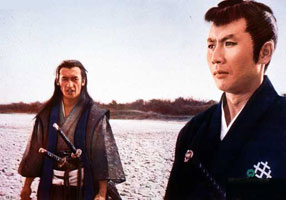 Meanwhile a young woman, Chisa (Haruko Wanibuchi), disguised as a samurai boy, makes it to Kyoto with the relic, only to discover her father Shurinosuke Asahina (Nobuo Kaneko) is not going to give it as an offering after all, but plans to sell it for profit. He reveals he's not her real father & kills her. Meanwhile a young woman, Chisa (Haruko Wanibuchi), disguised as a samurai boy, makes it to Kyoto with the relic, only to discover her father Shurinosuke Asahina (Nobuo Kaneko) is not going to give it as an offering after all, but plans to sell it for profit. He reveals he's not her real father & kills her.
Nemuri is captured by Christian nun gunners & brought to the evil father to deliver the written death-bed statement of Sonoei, Chisa's mother (Toshio Kimura), which informs the evil man that Chisa was his daughter after all, because he raped Sonoei eighteen years before, if he'll recall.
The script becomes too facile & ridiculous to have much emotional impact in "heavy" turns of plot like tjhat one. Plot twists abound but somehow don't make the superficiality of the story authentically more complex. Rather than pathos we have absurdity.
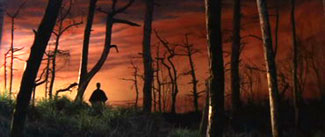 Though it's unlike Nemuri, he seems really to have loved Chisa. This capacity for love even Nemuri would ordinarily deny. Though it's unlike Nemuri, he seems really to have loved Chisa. This capacity for love even Nemuri would ordinarily deny.
But a close examination of the violent tale reveals that as point of fact he has avoided killing the Black Finger sect members even as they come after him with murderous intent through the numerous traps of the first third of the film.
The possibility that Kyoshiro Nemuri is heart a humane fellow, after eight films to the contrary, most viewers would be inclined to doubt. But that's part of the irony of his shifting nature, captured in the alternate title Kyoshiro Nemuri: Refraining from Villainy.
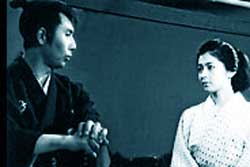 Now, however, to avenge Chisa, he does something he rarely does: he challenges the entire sect to a duel to the death. Now, however, to avenge Chisa, he does something he rarely does: he challenges the entire sect to a duel to the death.
As a rule Kyoshiro doesn't have to challenge anyone because he has plenty of opportunities to fight just by waiting calmly for foolish attacks. But over the murder of Chisa he feels rage, & acts accordingly.
Afer killing the evil father, he sets out to kill whoever is left of the Black Finger sect, using nito-ryu two-sword style in the final one-against-all battle. Alas it's not one of the most inspired fight scenes of the series, nor even the best one in this episode.
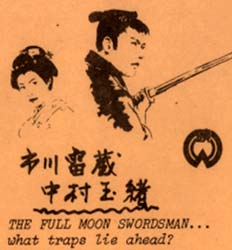 When only the sect leader Ukon Saegusa (Mikio Narita) remains, Nemuri reveals his interest in the matter to be his hatred of people who misuse the name of God, even though he personally doesn't believe in that god.
When only the sect leader Ukon Saegusa (Mikio Narita) remains, Nemuri reveals his interest in the matter to be his hatred of people who misuse the name of God, even though he personally doesn't believe in that god.
This is the essence of Nemuri's personality, his combination of dislike for corrupt christians (& his self-hatred for having been sired by a corrupt European missionary), & his personal hatred for christianity since he himself is the Son of a Black Mass.
He's a half-caucasion samurai repulsed by his own origin & it makes him more than a little weird or hard to fathom.
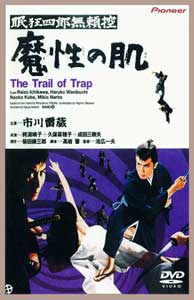 In the film's opening scene, we were treated to shots of that Black Mass, of Nemuri's birth, & of his mother's suicide. Later when the prostitute Oen (Naoko Kubo) asks if he is part foreign, his imperterbability comes undone & he refuses to talk about it. In the film's opening scene, we were treated to shots of that Black Mass, of Nemuri's birth, & of his mother's suicide. Later when the prostitute Oen (Naoko Kubo) asks if he is part foreign, his imperterbability comes undone & he refuses to talk about it.
His self-loathing is evident, & the obi-pulling scene when Kyoshiro humiliates Oen is very likely an acting out of his own self-esteem issues.
So this could well be a revealing moment regarding Nemuri's misogyny & his own slightly feminine appearance, & it must be noted that director Kazuo Ikehiro while not always strong with plots had a real gift for capturing visual images that convey psychological depth, even in action films.
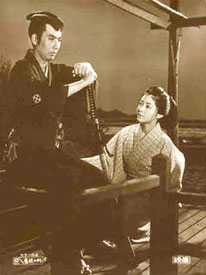 In the last duel we rather expect the two impressive actors, Raizo Ichikawa & Mikio Narita, to pull off a great one-on-one encounter. But Ukon is completely dazzled by Nemuri's full-moon style, & is swiftly cut down. In the last duel we rather expect the two impressive actors, Raizo Ichikawa & Mikio Narita, to pull off a great one-on-one encounter. But Ukon is completely dazzled by Nemuri's full-moon style, & is swiftly cut down.
In some ways a disappointing episode, in others, it reveals a lot of Nemuri's attitudes about himself. Alain Silver in The Samurai Film (2004 revised edition) states that the journey through a trap-laiden world "never really clarified" why Nemuri bothered with it all; nevertheless, "Trail of Traps uses that uncertainty to explore, visually & narratively, aspects of the 'hero's' personality."
Alain pinpointed that great strength of many films directed by Ikehiro, which can sometimes be over-the-top with ridiculous plots & manic action, but imbedded in them are strange little revelations about characters' miseries, self-loathings, or their demented decision-making processes.
For this reason, perhaps, Chris D. in Outlaw Masters of Japanese Film (2005) lists Trail of Traps in the short-list of Ikehiro's "masterpieces," though I personally feel that Ikehiro's only perfect work that merits that tag would be his Trail of Blood trilogy about Jokichi of Mikogami.
copyright © by Paghat the Ratgirl
|
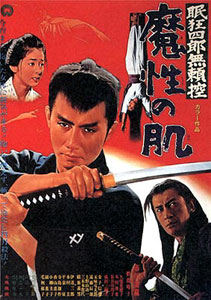

 Several Black Finger members leap out of nowhere & Nemuri can't reach his swords. However, he has a flat paper fan, because that would've been handy if the hot springs had worked out, & he uses the edge of the open fan to paper-cut the eyes of his attackers, blinding them.
Several Black Finger members leap out of nowhere & Nemuri can't reach his swords. However, he has a flat paper fan, because that would've been handy if the hot springs had worked out, & he uses the edge of the open fan to paper-cut the eyes of his attackers, blinding them.
 Though it's unlike Nemuri, he seems really to have loved Chisa. This capacity for love even Nemuri would ordinarily deny.
Though it's unlike Nemuri, he seems really to have loved Chisa. This capacity for love even Nemuri would ordinarily deny. Now, however, to avenge Chisa, he does something he rarely does: he challenges the entire sect to a duel to the death.
Now, however, to avenge Chisa, he does something he rarely does: he challenges the entire sect to a duel to the death.
 In the film's opening scene, we were treated to shots of that Black Mass, of Nemuri's birth, & of his mother's suicide. Later when the prostitute Oen (Naoko Kubo) asks if he is part foreign, his imperterbability comes undone & he refuses to talk about it.
In the film's opening scene, we were treated to shots of that Black Mass, of Nemuri's birth, & of his mother's suicide. Later when the prostitute Oen (Naoko Kubo) asks if he is part foreign, his imperterbability comes undone & he refuses to talk about it. In the last duel we rather expect the two impressive actors, Raizo Ichikawa & Mikio Narita, to pull off a great one-on-one encounter. But Ukon is completely dazzled by Nemuri's full-moon style, & is swiftly cut down.
In the last duel we rather expect the two impressive actors, Raizo Ichikawa & Mikio Narita, to pull off a great one-on-one encounter. But Ukon is completely dazzled by Nemuri's full-moon style, & is swiftly cut down.